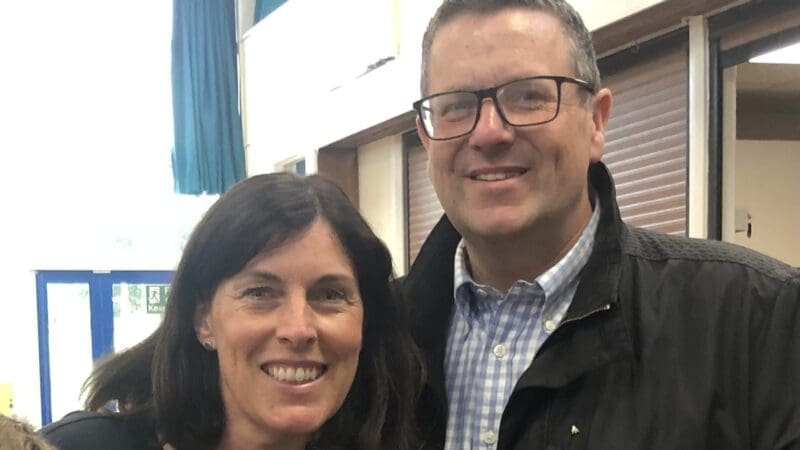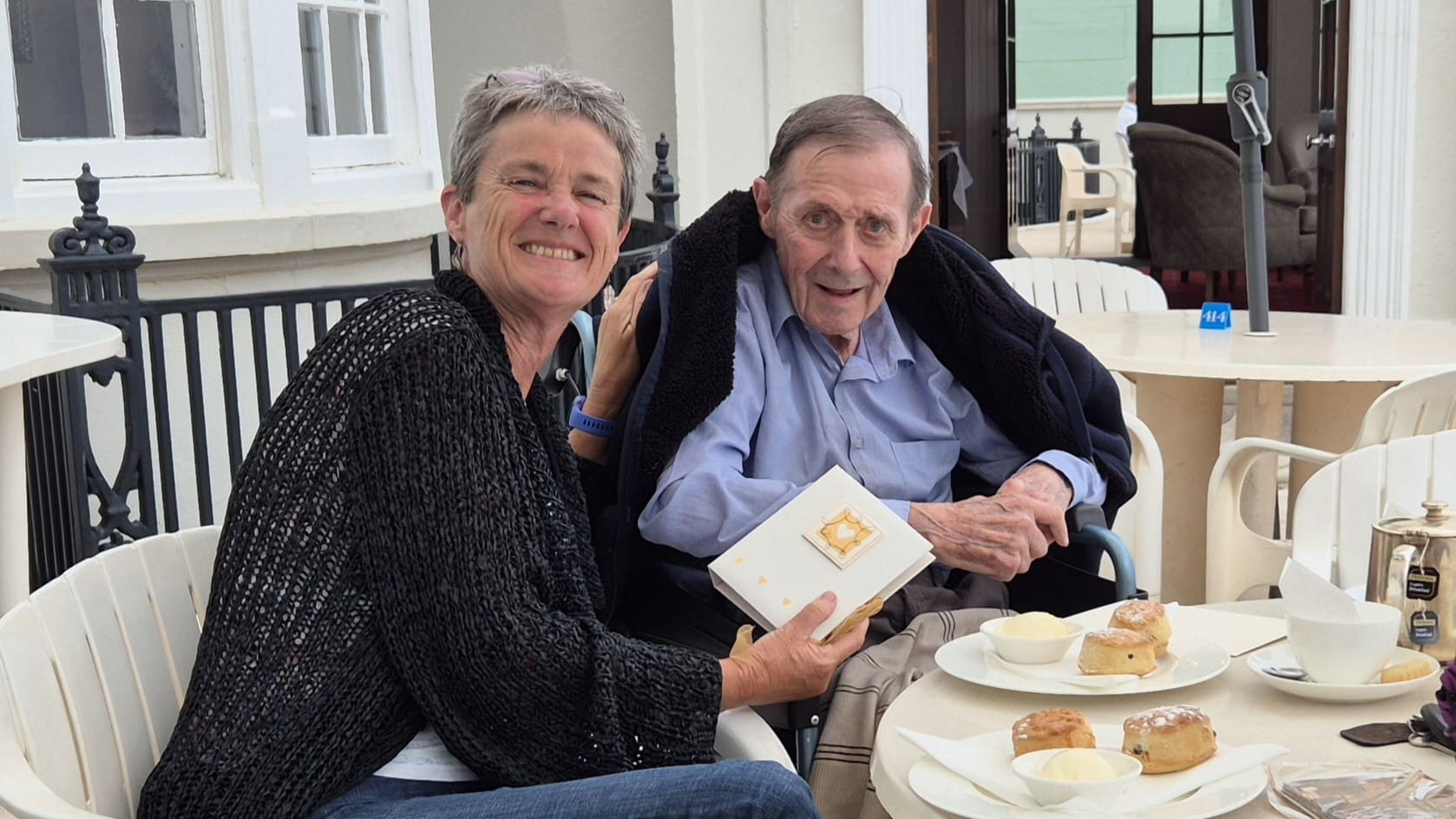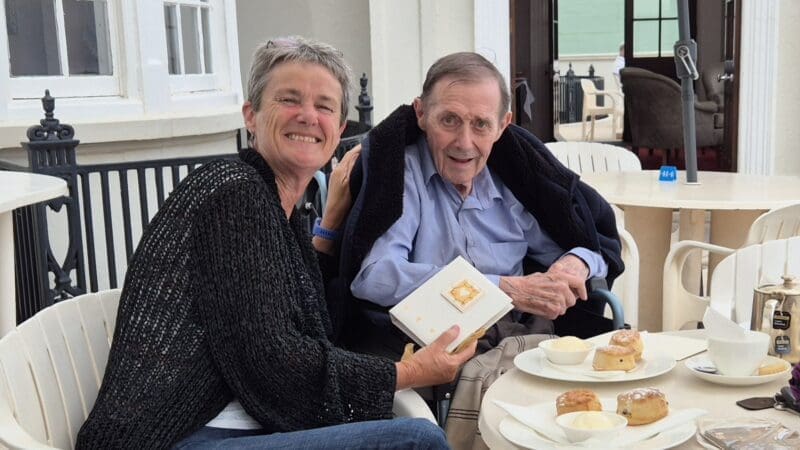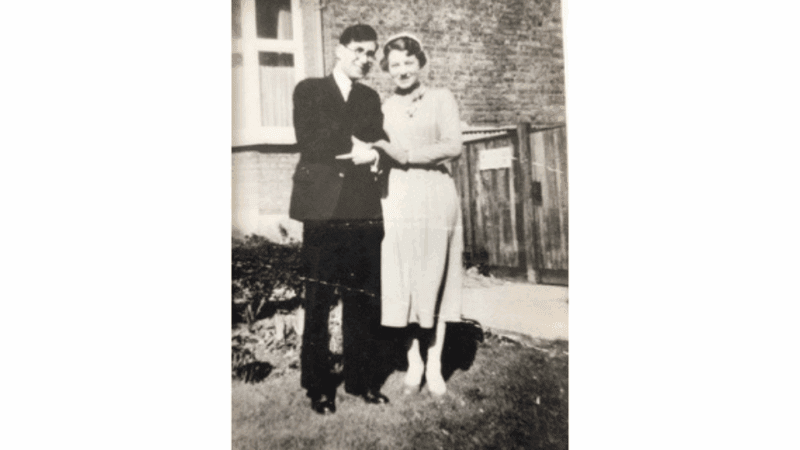
Sarah’s story – “Dementia UK was our saving grace”
Sarah reflects on reaching crisis point when her husband, David, was diagnosed with young onset dementia and the support her family have since received from Dementia UK.

Jo reflects on the support she has received from her Admiral Nurse, Liz, since her husband was diagnosed with dementia.
John and I met when I was 25 and he was 46. He had a very youthful outlook on life, so I never really noticed our age gap at the time. We met on stage in a village pantomime. I played Aladdin and John was my on-stage brother, Wishee Washee.
John had many other talents, including cooking, growing vegetables, making wine and jam, knitting and sewing, playing multiple instruments, sports and DIY. He even had a pilot’s licence. All while running his own business as a chartered surveyor for 40 years.
I always described John as my rock, and I was the kite. He was a very grounded and solid presence in my life. John took care of me and managed everything from the finances to running our household. He was and still is the kindest man I’ve ever known and everyone loves him. He is a lovely, gentle person with a great sense of humour.
In 2013, I ran the Barcelona Marathon, and John had a stroke during the trip. It wasn’t diagnosed for a long time, but I knew something wasn’t right.
Over the following couple of years, John’s personality began to change. He’d always seemed so young, but his ageing really accelerated. John started to struggle with remembering locations and didn’t always recognise roads and places he was familiar with. He began not recognising wider family members and became less able to do small tasks around the house. I remember asking him to feed the birds and he couldn’t work out the stages required to do it; there were too many connections for him to piece together.
In 2017, John went to the GP and following a memory test and further specialist assessment, was diagnosed with mild cognitive impairment. He was 73 years old. It was our 20th wedding anniversary and the prospect that it could lead to dementia was a terrible blow. I cried for days after, and I still do.
Over the next three years, John’s long-term memory became increasingly affected, his ability to look after himself was declining and his mobility became very poor. He was further diagnosed with alcohol-related dementia and vascular dementia. Alcohol-related dementia is not often talked about in the way that other types of dementias are.
John liked a drink; going to the pub was his way of socialising. But he was functioning and still worked until he was nearly 70. There’s a lot of stigma around this diagnosis and I want to help break that down.
John’s needs started to become a lot more complex and challenging. He developed issues with swallowing and incontinence and was having lots of falls. It reached the point where he was no longer able to walk independently. Caring became incredibly difficult, and I didn’t have time to do anything else; my whole world shrank.
In 2023, we were referred to our dementia specialist Admiral Nurse Liz, following John’s annual dementia review. When Liz came into our lives, it was a game changer. She gave us real understanding, kindness, support, genuine concern and a desire to help, signposting me to practical options, sources of information and support.
John’s incontinence issues got progressively harder to cope with, but I was reluctant to seek outside support. I told Liz that I was worried about dipping into our savings to pay for care as we had been saving for a rainy day. She said, “I think it’s raining now, isn’t it?” This gave me the reassurance I needed to look into care options. John started to attend a daycare facility, and we had carers come into the home to help with his personal care.
By February 2024, everything ramped up as John ended up with a spinal fracture from one of his falls. One day I was really struggling to even get out of bed, and Liz sent an email to say she was coming over the next day. She was phenomenal, stepping in to help us reach the right people and services. She got straight on the phone and within two days a whole posse of people came over like the cavalry with everything we needed: a hospital bed, equipment to help lift John, an occupational therapist. She helped guide me through all these complexities of getting the right support in place for John.
Last winter, things escalated again. John continued to have more falls and didn’t have any energy to walk. I had to push him to bed in a wheelchair every night even though it was only a few metres away. His incontinence was also an issue every single day.
I’ve struggled with mental health issues for most of my life, including depression and OCD, and I felt my symptoms start to intensify again. I was having panic attacks and developed terrible tinnitus. Some days, I could hardly get out of bed.
One night while I was getting John ready for bed, he looked at me and said, “You shouldn’t be doing this – I’d rather be dead.” It was a really sad moment for both of us.
John was admitted to hospital with a urine infection in February 2025. After a week on the ward, I arranged for him to be discharged to a care home to get him out of hospital as soon as possible. I felt conflicted and guilty about making that decision. Guilt is something I’ve felt a lot over my life as a result of my mental health, and it has been intensified since John’s diagnosis. But Liz was with me throughout this whole part of our journey, reminding me that I’d done my absolute best for John.
John was very settled in the care home. It was very strange not having him in the house, but we got to spend quality time together.
I took on my first fundraising challenge when I was eight years old and have taken part in many more since then. I reached my goal of running 50 marathons by the age of 50 and by 2023, I had completed 100 marathons! John was always so supportive of me, and I don’t think I would have achieved all of this without him.
For years I had been planning a NEWS walk (north, east, west, south), but when John fell ill I resigned myself to it no longer being possible. But Liz suggested that I break it down into stages and tackle each one individually, instead of thinking of it as one big challenge. She helped me realise it was possible to undertake it that way and still get there. She’s very good at helping carers understand the different stages of dementia in this way, too. She breaks down complex issues and helps you to just take the next step, rather than focusing on the entire journey ahead.
I booked the John O’Groats Trail the very next day, and knowing that John’s safety and wellbeing were taken care of, I had the most amazing time. I spoke to John many times and had some video calls with him. He even told me that what I was doing was admirable.
I anticipate it will take a number of years to do the NEWS walk in stages and hoping to complete the next walk in spring 2026, but I’m really passionate about raising funds and awareness for Dementia UK. It feels good to give something back.
Dementia has been part of my life for a long time, and I’ve lost so many loved ones to it, including my dad. It feels unbearably cruel, but my dad and John inspire me to share my experiences and do what I can to make a difference.
I don’t know how I would have got through the last two years without Liz. She is very much part of our journey, and I know she will be with me all the way. Liz is now my rock.
John’s respite stay enabled him to improve enough to be looked after at home again with domiciliary support. It also broke his lifetime pipe smoking and alcohol dependency, which has been amazing, and contributed to his overall better wellbeing. As always Liz has been a great support and continues to be now he’s home.

Sarah reflects on reaching crisis point when her husband, David, was diagnosed with young onset dementia and the support her family have since received from Dementia UK.

Jo reflects on the support she has received from her Admiral Nurse, Liz, since her husband was diagnosed with dementia.

Kerry reflects on her mum's dementia journey and her experience doing two of Dementia UK’s virtual event challenges.